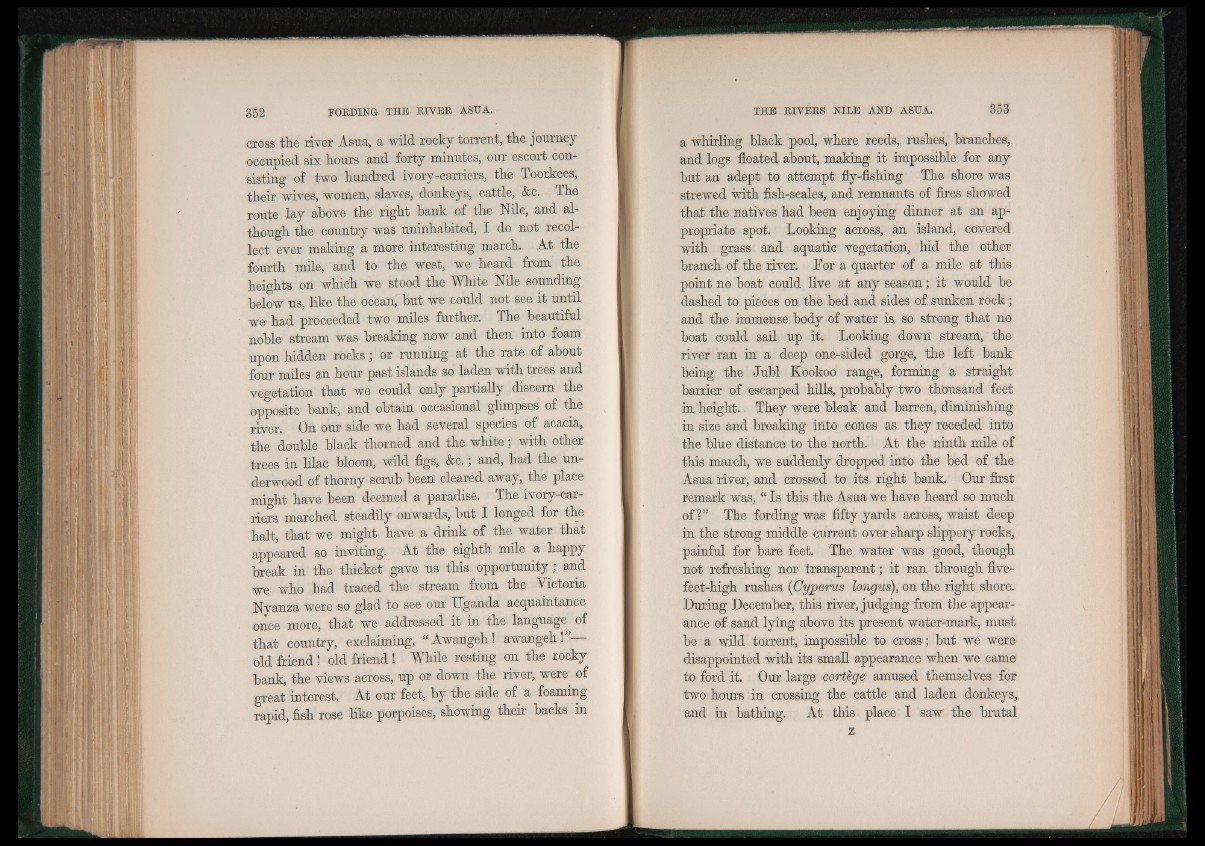
cross the river Asua, a wild rocky torrent, the journey
occupied six hours and forty minutes, our escort consisting
of two hundred ivory-carriers, the Toorkees,
their wives, women, slaves, donkeys, cattle, &c. The
route lay above the right hank of the Nile, and although
the country was uninhabited, I do not recollect
ever making a more interesting march. At the
fourth mile, and to the west, we heard from the
heights on which we stood the White Nile sounding
below us, like the ocean, hut we could not see it until
we had proceeded two miles further. The beautiful
noble stream was breaking now and then into foam
upon hidden rocks; or running at the rate of about
four miles an hour past islands so laden with trees and
vegetation that we could only partially discern the
opposite bank, and obtain occasional glimpses of the
river. On our side we had several species of acacia,
the double black thorned and the white; with other
trees in lilac bloom, wild figs, &c.; and, had the underwood
of thorny scrub been cleared away, the place
might have been deemed a paradise. The ivory-carriers
marched steadily onwards, but I longed for the
halt, that we might have a drink of the water that
appeared so inviting. At the eighth mile a happy
break in the thicket gave us this opportunity; and
we who had traced the stream from the Yictoria
Nyanza were so glad to see our Uganda acquaintance
once more, that we addressed it in the language of
that country, exclaiming, “Awangeh! awangeh!”—
old friend t old friend! While resting on the rocky
bank, the views across, up or down the river, were of
great interest. At our feet, by the side of a foaming
rapid, fish rose like porpoises, showing their backs in
a whirling black pool, where reeds, rushes, branches,
and logs floated about, making it impossible for any
but an adept to attempt fly-fishing The shore was
strewed with fish-scales, and remnants of fires showed
that the natives had been enjoying dinner at an appropriate
spot. Looking across, an island, covered
with grass and aquatic vegetation, hid the other
branch of the river. For a quarter of a mile at this
point no boat could live at any season; it would be
dashed to pieces on the bed and sides of sunken rock;
and the immense body of water is so strong that no
boat could sail up it. Looking down stream, the
river ran in a deep one-sided gorge, the left bank
being the Jubl Kookoo range, forming a straight
barrier of escarped hills, probably two thousand feet
in height. They were bleak and barren, diminishing
in size and breaking into cones as they receded into
the blue distance to the north. At the ninth mile of
this march, we suddenly dropped into the bed of the
Asua river, and crossed to its right bank. Our first
remark was, “ Is this the Asua we have heard so much
of 2” The fording was fifty yards across, waist deep
in the strong middle current over sharp slippery rocks,
painful for bare feet. The water was good, though
not refreshing nor transparent; it ran through five-
feet-high rushes (Cyperus longics), on the right shore.
During December, this river, judging from the appearance
of sand lying above its present water-mark, must
be a wild torrent, impossible to cross; but we were
disappointed with its small appearance when we came
to ford it. Our large cortege amused themselves for
two hours in crossing the cattle and laden donkeys,
and in bathing. At this place I saw the brutal
z